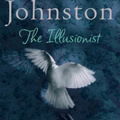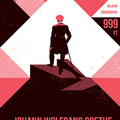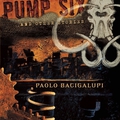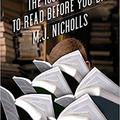William Nicholson: The Society of Others

I'm not a bad person. I'm a bad person.
I didn't mean to kill the man in the reading room. I did mean to kill the man in the reading room.
What happened afterwards wasn't my fault, don't blame me. It was my fault. Blame me.
I came across the above quote by chance and I immediately knew I wanted to read this novel, and I even suspected that I was going to like it. I do not like to over-mystify this and say that I felt as if the book was calling out to me and was irresistibly drawing me towards itself. I'd much rather put it this way: it happens to me sometimes that I read a couple of sentences from a novel, out of context, my curiosity arises in a moment and I want to know at once what other stuff can be found in a book that contains such exquisite sentences. Luckily, the novel was for sale on a low price at a big bookstore chain, so I bought it to find out if my gut feeling was right about this book. (It was.)
The Society of Others tells the story of a twenty-something, nameless and aimless boy, told in the 1st person singular. One day the boy decides to spend his 1000 pounds he got from his father as a graduation present to hitchhike somewhere – it does not matter where. He is picked up by a truck-driver, heading towards an unnamed European country (to be more precise, the boy does not hear it clearly when the driver tells him his destination and he does not bother to ask again), and this suits our hero just fine, as he is right on his way to lose himself entirely. When arriving to the unknown country, it turns out that the place is a less then friendly totalitarian state, controlled by the police, and realizing the danger, the spleen of the protagonist disappears in a moment, and leaving the country alive as soon as possible becomes his major concern.
The irony of the previous paragraph is only a scam: in reality, I loved the narrator from the very first page, who, by the way, declares at the beginning of the story that he would not tell his name and advises the reader to use his own if he needs one. I followed his advice and used my own name, and at once I felt close to the boy’s life and thoughts. Identifying with the protagonist was all the easier because the boy has an absolutely everyday life which might be familiar to several readers in their twenties (it was for me, though not from my own experience): the boy just graduated from a not particularly good college, in a not particularly interesting subject, and now it would be time to grow up and look for a job, however, it is much more convenient for him to sit around in his room and argue that he never asked to be born in the first place, therefore no-one has the right to expect any activity from him.
Probably in real life I would not have too favorable an opinion of such a passive, inert, self-justifying person, but fortunately this is not life but literature, so I quickly took a liking to the narrator and I enjoyed reading his witty, slightly sad and cynical remarks on his family, the world of supposedly infinite possibilities, the way dreams slowly die, and also on his own inactivity and introversion. (Nicholson’s young boy, by the way, reminded me slightly of the narrator or Erlend Loe’s Naiv.Super.)
Of course all of this changes when the boy starts his journey. This is not the first novel about a journey on which the protagonist reaches his maturity, on the contrary, I believe this is quite an overused concept in literature, but Nicholson manages to fill the old form with new life. I will not go into the details of the narrator’s experiences in the foreign country, all I wish to mention is that the way the protagonist’s confidence, disillusionment and complacency is contrasted to the simple but satisfied lives of the inhabitants of the totalitarian state who live under constant threat is very effectively contrived.
However, this is not only about the way the boy’s comfortable life in England is contrasted with the hard life of the people of the unnamed Eastern European (?) county – this is also about the boy facing reality for the first time in his life. The first 30 or 40 pages of the novel depict a well-organized and well-protected life – a life which is often lived only in theory. When he arrives in the foreign country, the protagonist suddenly finds himself in real life where words and actions have consequences.
Yes, there are probably hundreds of novels on this subject. What makes this novel stand out from amongst the hundreds is the following: while the protagonist is struggling to learn how to exist in reality and not only in his mind, his previous complacent way of thinking comes to the foreground from time to time, and then it seems as if he considered all his current experiences to be fictional – or perhaps this means that by thinking about the inessential, everyday details of life, the boy erects a fence between himself and the over-realistic reality which surrounds him. For instance: our hero can indulge in a one and a half page long essay on the making of the ideal bathwater even amongst the greatest dangers and difficulties, and digressions like this generate a very interesting tension in the text.
This tension and the digressions are all the more welcome as it is partly because of these that the novel does not degenerate into one of the usual unrealistic books about some larger than life hero’s struggles to find his own way and happiness, and change his life. For me at least it seems much more authentic if a character of a novel sometimes ponders over trivialities, and does not spend all his time thinking about majestic ideas. And since the protagonist behaves in such a simple, but very human way (which is, by the way, manifested not only in his habit of pondering over small stuff), I believe his more serious thoughts and the story of accepting his own path in life much more easily.
What also makes this novel different from the usual Coelho-style, find-your-own-way bestseller is the language the protagonist uses: he speaks in a modern, slightly informal, slightly slangy way, and this makes his character even more authentic to me – sometimes I positively felt that I could easily have been in his place.
Probably this is not the most important part in the interpretation of the novel, still, the question of the translation also made me think. I wondered how faithfully the translator mirrored the informality of the boy’s language usage and how outdated this language would seem to be in 10 or 20 years’ time. What I mean here is that the translator used expressions in the book which qualify as a bit slangy in Hungarian and I do not know if the original novel contains words with similar qualities. The words the translator employs are easy to understand now, but I am not sure if they remain so in 20 years, or they become ridiculous-sounding.
Besides all my well-earned praise, I must also add that the final scene of the novel and the conversations (covering mostly religious topics) that lead up to that scene tired out my patience a little bit. These conversations were a bit too pompous to my taste (or perhaps I can even say: phony), but the preceding 200 pages were so outstanding that they make me forget about the slightly slimy quality of the final couple of chapters.





